Nowadays, when you walk into many restaurants or cafes, you might immediately spot the tablet they will inevitably turn towards you to ask for a tip. However, more shockingly, this practice has started spreading to totally unrelated industries.
TikToker Ina Josipović shared her surprise when, after purchasing a wedding dress, the employees of the bridal store asked for a tip. Readers shared their own stories and debated the slow and steady spread of tipping culture into every single retail experience.
More info: TikTok
Most of us wouldn’t expect to get a request for a tip in a bridal store
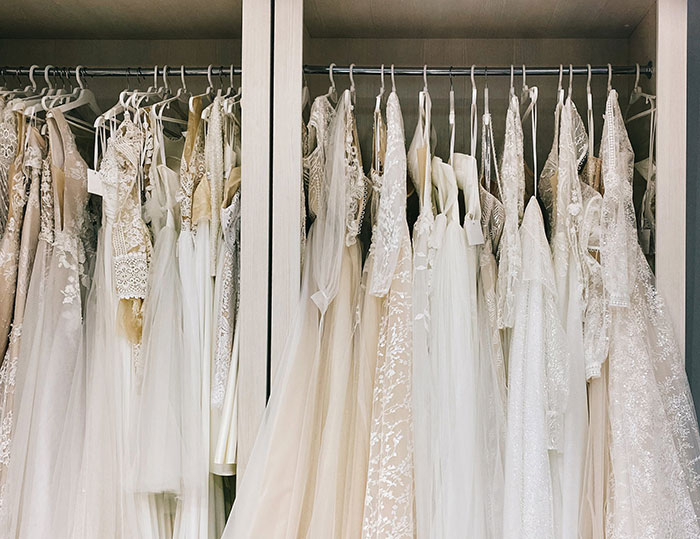
Image credits: Kate Andreeshcheva (not the actual photo)
“Can we talk about ‘tipping culture and the weirdest place that you’ve ever been asked to tip’ really quick? I went shopping for my wedding dress a week and a half ago, and I ended up finding my dress at the first store that I went to. And I’m not joking, when I went to go pay, they flipped their little iPad around and asked for a tip. When I tell you I full on froze, I just… I stood there and I think they saw the blood leave my body. I did not expect to have to tip buying a wedding dress. And mind you, the store was empty. It was me, my best friend, and then the three people that work there. I think one was the owner and then just two stylists or something. So it was just empty. It was just them three at the front and then me just paying, and I think my best friend was to the side looking at more dresses.”

Image credits: inajosipovic
“So I just kind of stood there. And luckily, I speak a different language, and my best friend bought a wedding dress at a different store sometime last year, so in a different language I looked at her and I said, ‘Hey, did you tip when you bought your wedding dress?’ And she was like, ‘No’. And then I was like, ‘Did they ask you to tip?’ And she said no. So then I was like, oh my god, I really don’t think I need to be tipping when you buy a wedding dress. So I’m just standing there trying to do the math in my head because the dress is already expensive, right. And then a 10% tip on a $1500, $2,000 dress is like another $200. And if the dress is even more, you’re paying a couple $100. Which I guess if you can afford a $10,000 dress, maybe a tip isn’t that big of a problem. But most people really can’t, right?”

Image credits: inajosipovic
“My mom’s the one who paid for my dress. I was just the one that was paying for it on my Amex trying to get those points. Anyway, I just stood there. And so I was like, okay, I’m not going to tip a couple $100 because that’s a lot. And again, why am I tipping at a bridal store? So then I’m doing the math and I’m like, maybe I’ll just press custom and just do like a $50 tip which I think ends up being like 1.5% which is almost embarrassing. But if you guys think your stylist deserves a tip, why don’t you just give her commission instead of asking me to tip? Or maybe I’m wrong. Have any other brides ever tipped when they bought their wedding dress? I don’t know, maybe I’m being weird but I just don’t feel like that was a service that… I guess she brought dresses out to me but I did that when I worked at stores. I just got commission off selling clothes to people, it wasn’t… Nobody was tipping me at a retail store. I don’t know. Tipping is kind of weird lately.”

Image credits: inajosipovic
You can watch the full video here
@inajosipovic the bosnian in me really shows with all that hand movement lol #foryou #fyp #viral #tips #tippingculture #bride #bridetobe #2024bride #wedding #weddingtiktok #weddingdress #utah ♬ original sound – inajosipovicSlowly and steadily, more and more places have started suggesting tips
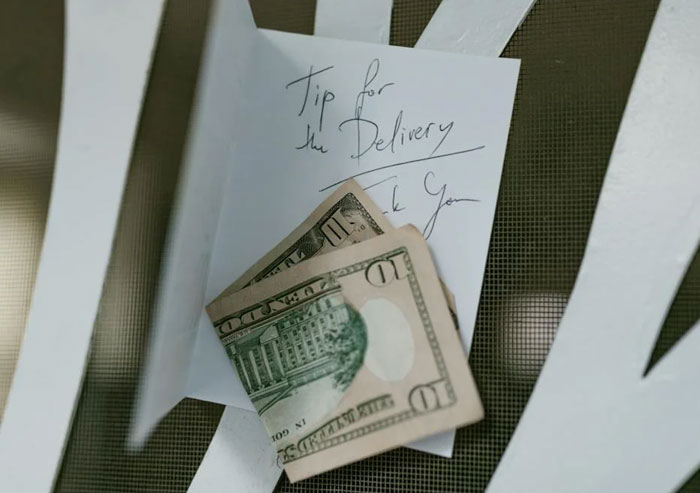
Image credits: RDNE Stock project (not the actual photo)
Debates over tipping these days tend to focus on two different aspects. Do you tip in your area in general and what is considered a “normal” tip? After all, while tipping is quite normal and even expected in the US, in most places, it’s a reward for particularly good service. On the other hand, in some places giving a tip is considered downright rude and disrespectful.
Of course, even in the US, tipping is hardly universal. However, as the commenters indicated (you can find other examples below) certain businesses are trying to make this entire idea more normal. While some of us might tip our regular barber or a trusted mechanic (who no doubt pays for themselves by not inventing issues for your car) the idea of tipping the cashier at a store or the attendant at a car wash seems deeply alien.
All this noise obscures the real and somewhat legitimate, original reasons why tipping existed in the first place. Particularly in the US, many restaurants had very low wages and it was assumed that tips would make up the difference. In other words, servers and wait staff absolutely needed tips to survive. However, the price of labor is factored into the price of something in any reasonable business. So it’s hard to see how a store can justify a tip on something they are already profiting from.
Not every business actually needs some sort of gratuity

Image credits: Pixabay (not the actual photo)
Even worse, sometimes folks will be asked to give a tip by the literal owner of the business. The same owner that can, freely, pocket every last cent of profit they make that day. Supporting small businesses is always good, but this doesn’t mean you should be expected to fork over an additional 20% of your costs to someone who is already pocketing the marginal value of the product.
In general, tipping culture can be hard to discuss, because taking a hardline stance against it can make one seem heartless and cheap. On the other hand, embracing it means paying an extra 10 to 30% for someone to ring up your to-go sandwich and soda at the counter. While you can always press no, many businesses are well aware that social pressure will get enough people to still comply.
Now people have started to demand tips, instead of it just being an offer
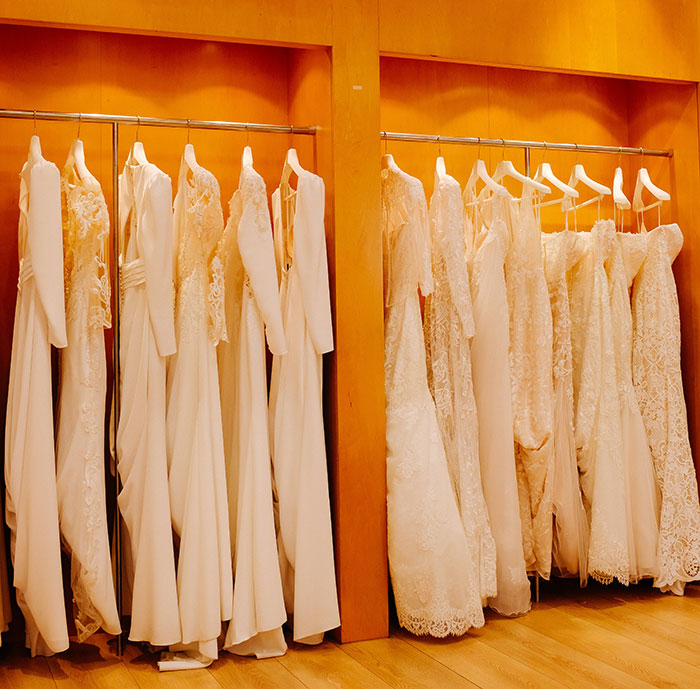
Image credits: Adrien Olichon (not the actual photo)
The other issue is the assumption that the service providers, from a bridal salon employee to a server are entitled to a tip. Even if it’s a norm in the country, the switch from the tip being initiated by the customer to the employee setting it as the first or default option just feels wrong. While it’s nice that many, many people, deep down are people pleasers, this allows greedy business owners to hijack this emotion for their own profit.
Overall, tips tend to persist because people in service positions are simply not paid enough. From the other side, people do like to reward good work, so if you truly enjoyed a server’s hospitality, giving them a little (or a lot) extra feels great for both parties. By attempting to squeeze out a bit more cash, these businesses might tank the entire idea of tipping. Perhaps it’s for the best.
Viewers shared similar stories











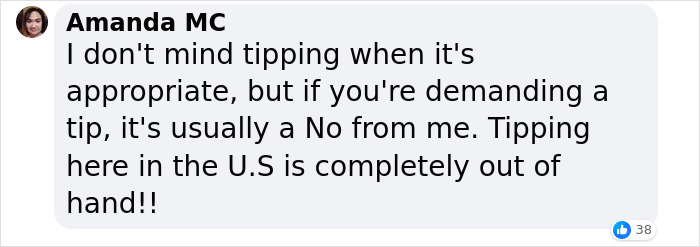
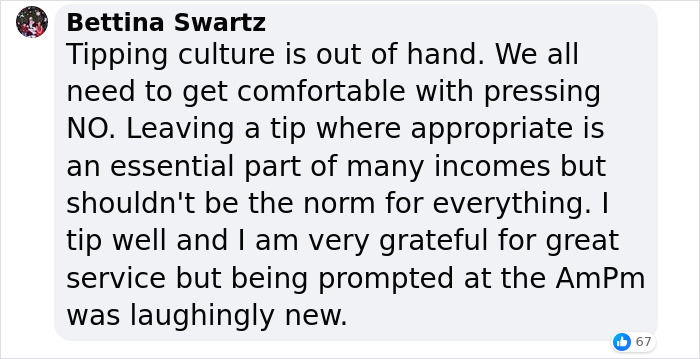

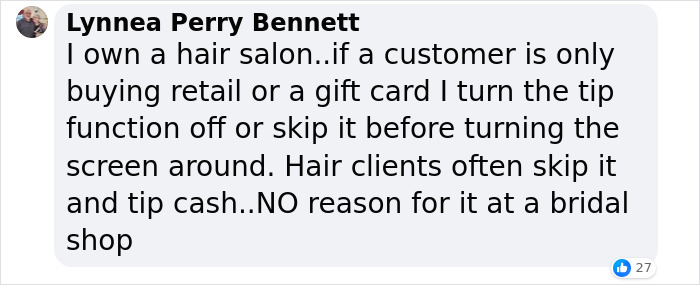


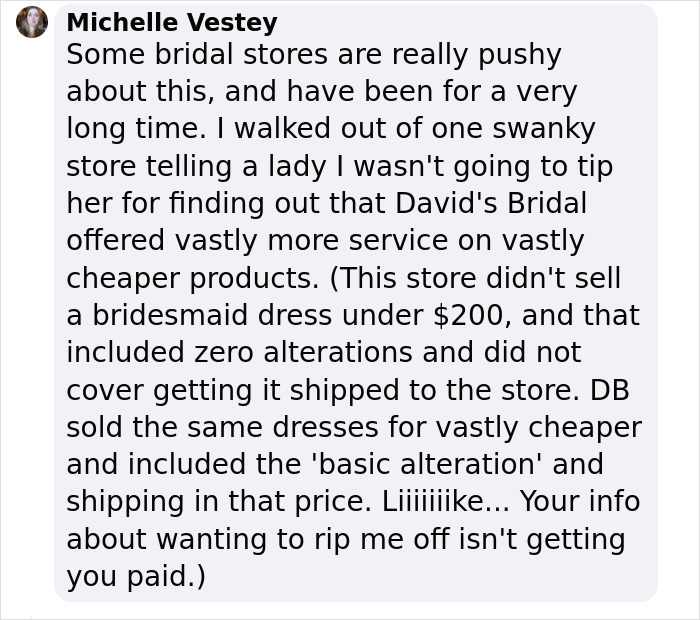












 English (US) ·
English (US) ·